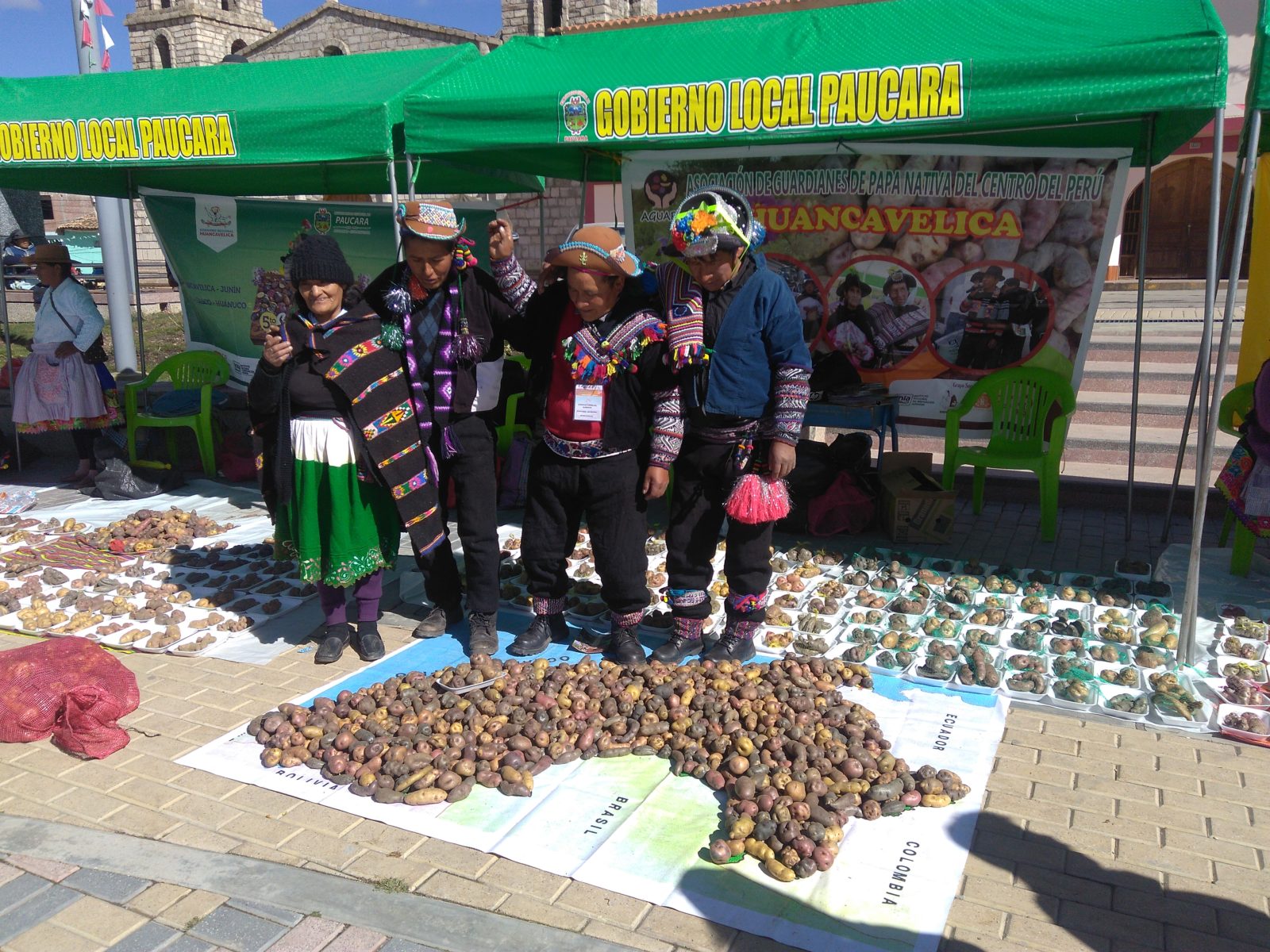
Seed fair during annual meeting of Aguapan en Huancavelica. Photo credit B. Heider/CIP
RTB crops (banana including plantains, cassava, potato, sweet potato, yams, and a rich array of “minor” root and tuber crops) form the basis for food security for 300 million poor people living in the global South. The efforts by breeders to improve the yields and performance of these crops for the benefit of farmers have depended on the genetic diversity of local varieties and their wild relatives in their centers of origin and diversity, which also have important social and cultural values for local communities, men and women. Breeders and other users of germplasm mostly obtained their genetic materials from genebanks. But the genetic diversity in RTB crops occurring on farms and in wild habitats are critically important for, not only maintaining a resilient production system but also for serving as a source of raw genetic materials required by breeders for crop improvement. A clear understanding of the extent of genetic diversity of RTB crops and their characteristics, efforts to conserve them in situ to allow them to evolve and benefit local communities, as well as their conservation in genebanks for easy access, are fundamental strategies for the long-term sustainability of our food system, food, and nutritional security. This webinar will present the results of the RTB genetic diversity cluster of Flagship 1 in assessing the genetic diversity of four RTB crops (banana, cassava, potato, and yam) in three hotspots areas in Peru, Benin, and Papua New Guinea, by RTB scientists from CGIAR centers (Alliance of Bioversity and CIAT (Alliance), CIP, IITA) and CIRAD.
PROGRAMME
Moderators: Ehsan Dulloo (Alliance of Bioversity International and CIAT) and Michael Abberton (IITA) – co-cluster leaders of RTB (5 mins)
Opening remarks: Michael Friedmann on behalf of Graham Thiele, Director of RTB (5 mins)
PRESENTATIONS/ SPEAKERS: (60 mins)
- In situ conservation of yams in Benin – Alexandre. Dansi, University of d’Abomey Calavi, Benin
- Hunting for wild and domesticated yams in Benin – Ranjana Bhattacharjee (IITA)
- Root, tuber and banana hotspots in Papua New Guinea – National Agricultural Research Institute, Papua New Guinea – Birte Nass-Komolong and Janet Paofa
- New discovery of genetic diversity banana and yam in situ diversity – Julie Sardos and Bart Panis (Alliance of Bioversity International and CIAT) and Hana Chaïr (CIRAD)
- AGUAPAN: fomenting custodian farmer self-representation and direct benefit-sharing – Aurea Mendoza (vice-president) (in Spanish)
- Dynamic on-farm conservation of cassava and potato landraces by indigenous communities in Peru: 5 key lessons and recommendations from RTB fieldwork. Eric Delaquis (Alliance of Bioversity International and CIAT) and Stef de Haan (CIP)
- Repatriation of potato landraces to increase on-farm diversity and food security – Sophia Luettringhaus (Humboldt University of Berlin, Postdam Institute of Climate Impact Research /CIP)
Presentation of in situ Conservation Knowledge Base – Max Ruas (the Alliance) (5 mins)
Reflections on in situ conservation from invited speakers (40 mins)
- Karl Zimmerer, Pennsylvania State University, USA
- Carlo Fadda, Alliance of Bioversity International and CIAT (IDT, One CGIAR Initiative on Nature Positive Agriculture System)
- Michael Abberton, IITA (IDT, Genebank Platform)
- Martin Kropff, Global Director, Resilient Agri-Food System
- Oscar Ortiz, CIP, One CGIAR Initiative Genetic Innovations Questions and Answers
Wrap up by RTB Flagship Leader – Luis Augusto Becerra Lopez-Lavalle (Alliance of Bioversity International and CIAT) (5 mins)